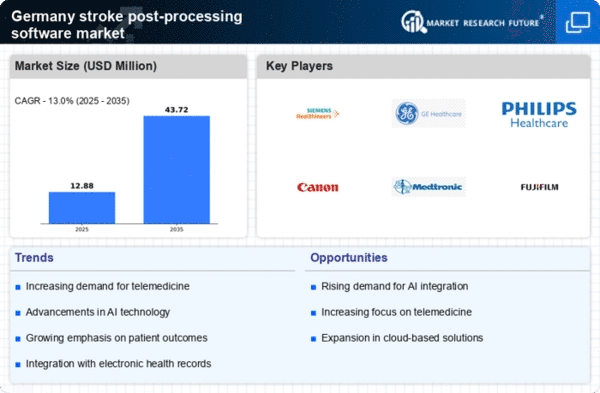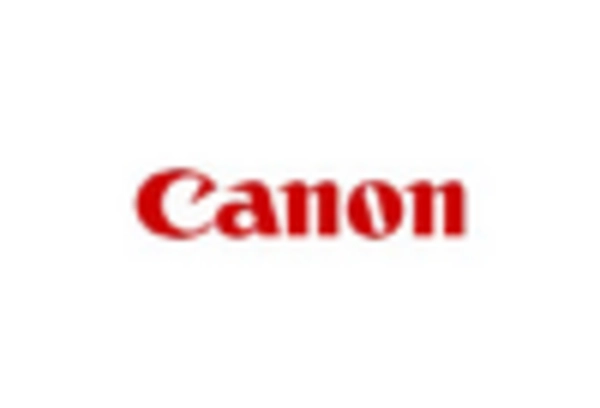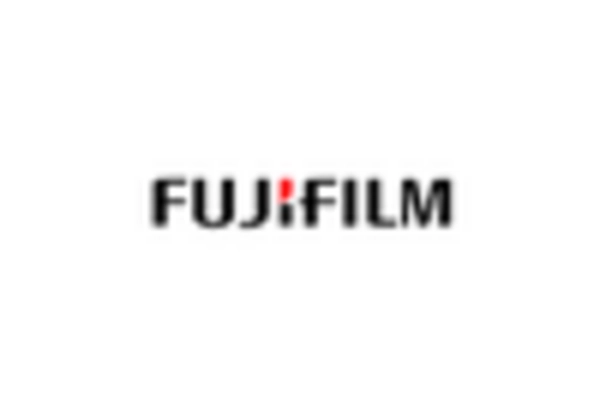Growing Emphasis on Telemedicine
The rising emphasis on telemedicine in Germany is reshaping the landscape of the stroke post-processing-software market. As healthcare providers increasingly adopt remote consultation and monitoring solutions, the need for software that can facilitate these services becomes critical. Stroke patients often require timely interventions, and telemedicine can bridge the gap between patients and healthcare professionals. The integration of post-processing software with telehealth platforms allows for real-time analysis and sharing of imaging data, enhancing patient management. This shift towards telemedicine is projected to contribute to a market growth rate of approximately 10% over the next few years, as more healthcare facilities recognize the benefits of remote care solutions.
Rising Incidence of Stroke Cases
The increasing prevalence of stroke cases in Germany is a primary driver for the stroke post-processing-software market. According to recent health statistics, stroke remains one of the leading causes of morbidity and mortality in the country. The aging population, coupled with lifestyle factors such as hypertension and diabetes, contributes to this rise. As healthcare providers seek to improve patient outcomes, the demand for advanced post-processing software that aids in the diagnosis and treatment of stroke is likely to grow. This software enhances the analysis of imaging data, allowing for quicker and more accurate assessments. Consequently, the stroke post-processing-software market is expected to expand as healthcare facilities invest in these technologies to manage the increasing patient load effectively.
Rising Awareness of Stroke Prevention
There is a growing awareness of stroke prevention strategies among the German population, which is positively impacting the stroke post-processing-software market. Public health campaigns and educational initiatives have increased knowledge about risk factors and the importance of early detection. As individuals become more proactive about their health, there is a corresponding rise in demand for diagnostic tools that can identify strokes at an early stage. This trend encourages healthcare providers to invest in advanced post-processing software that can enhance diagnostic accuracy and speed. Consequently, the market is likely to experience growth as healthcare systems adapt to meet the needs of a more informed patient population.
Technological Advancements in Imaging
Technological innovations in imaging modalities, such as MRI and CT scans, are significantly influencing the stroke post-processing-software market. Enhanced imaging techniques provide clearer and more detailed images, which are crucial for accurate diagnosis and treatment planning. The integration of advanced algorithms and machine learning capabilities into post-processing software allows for improved image analysis, facilitating better clinical decision-making. In Germany, the healthcare sector is increasingly adopting these technologies, leading to a projected market growth of approximately 15% annually. As hospitals and clinics upgrade their imaging equipment, the demand for compatible post-processing software is expected to rise, further driving the market's expansion.
Increased Investment in Healthcare Infrastructure
Germany's commitment to enhancing its healthcare infrastructure is a significant driver for the stroke post-processing-software market. The government has allocated substantial funding to modernize healthcare facilities and improve patient care services. This investment includes the procurement of advanced medical technologies, including stroke post-processing software. As hospitals upgrade their systems, the need for sophisticated software solutions that can integrate with existing technologies becomes paramount. This trend is likely to result in a robust growth trajectory for the market, with projections indicating a potential increase in market size by over €100 million in the next five years. The focus on improving healthcare delivery systems is expected to create a favorable environment for software developers and providers.
















